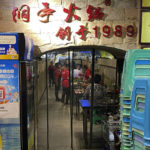Some like it hot: Eating spicy in China’s WWII shelters
Aug 24, 2022, 10:32 AM | Updated: 10:35 pm

Customers eat hotpot in a hotpot restaurant located in a converted WWII-era air raid shelter in southwestern China's Chongqing Municipality, Saturday, Aug. 20, 2022. The city of Chongqing, dubbed one of China's four "furnace" cities, is known for both soaring temperatures and spicy cuisine - notably its hotpot, a peppery bubbling tabletop broth into which diners dunk bite-size pieces of food to cook and eat. (AP Photo/Mark Schiefelbein)
(AP Photo/Mark Schiefelbein)
CHONGQING, China (AP) — The city of Chongqing, dubbed one of China’s four “furnace” cities, is known for both soaring temperatures and spicy cuisine — notably its hotpot, a peppery bubbling tabletop broth into which diners dunk bite-size pieces of food to cook and eat.
The inland metropolis on the Yangtze River has the perfect escape to enjoy hotpot, even in what has been a summer of unusually stifling heat: World War II-era air raid shelters, converted into restaurants, where the temperature is naturally cooler.
Locals call it “cave hotpot.”
Chongqing was the temporary capital of China during World War II, as a Japanese invasion drove the government out of the then-capital, Nanjing, and occupied eastern China. Leader Chiang Kai-shek, the military, foreign diplomats and others set up in what was then a remote city in the southwest.
At the sound of air raid sirens, residents crowded into the often dark shelters dug into the hilly cityscape to protect people and military weapons. Thousands died in the Japanese aerial bombing attacks.
Today, the stone arch doorways of the former shelters still dot the city. Some have become cafes and mahjong parlors and others, restaurants.
Red Chinese characters hang over one entrance, its stonework half-hidden by a refrigerated drinks display case and stacked up plastic chairs. The characters read: “Cave Pavilion Hotpot. Founded 1989.”
Inside, tables and chairs line two long and narrow tunnels connected by a corridor. A starry night sky has been painted on the semicircular roof to reinforce a feeling of coolness. A painting of a World War II fighter plane hangs on the wall.
Diners drop beef tripe, meat, fish and vegetables into a bubbling broth filled with floating red chili peppers and lip-numbing Sichuan peppercorns. A non-spicy broth is also available — in a smaller container.
“We stay away from the summer heat in these air raid shelters,” said Tang Ronggang, as wisps of steam rose in front of his face from the hotpot on his table. “It’s cool in here, a good place to stay in summer.”
Particularly this summer, which has seen what meteorologists are calling China’s strongest heat wave since the government began recording rainfall and temperature 61 years ago. High temperatures have persisted for more than two months, topping 40 degrees Celsius (104 Fahrenheit) in many places.
Shopping malls have closed in Chongqing for most of the daytime to conserve power. Wide swaths of the Yangtze and Jialing rivers, which meet in the city, have dried up, drawing people to the exposed riverbed. The extended heat and drought is blamed on a high-pressure system parked over western Russia that is also causing this summer’s heatwaves in Europe.
Chongqing, immediately east of Sichuan, was part of the province until the city and the surrounding area was broken off administratively in 1997.
Some date the city’s hotpot tradition to the 16th century, when porters ate meat and vegetables boiled with fiery spices after a hard day’s work on the docks on the Jialing River. The dish moved into abandoned air raid shelters in the 1970s, giving birth to a new tradition, the cave hotpot.
___
Associated Press video producer Olivia Zhang contributed.
Copyright © The Associated Press. All rights reserved. This material may not be published, broadcast, rewritten or redistributed.


















